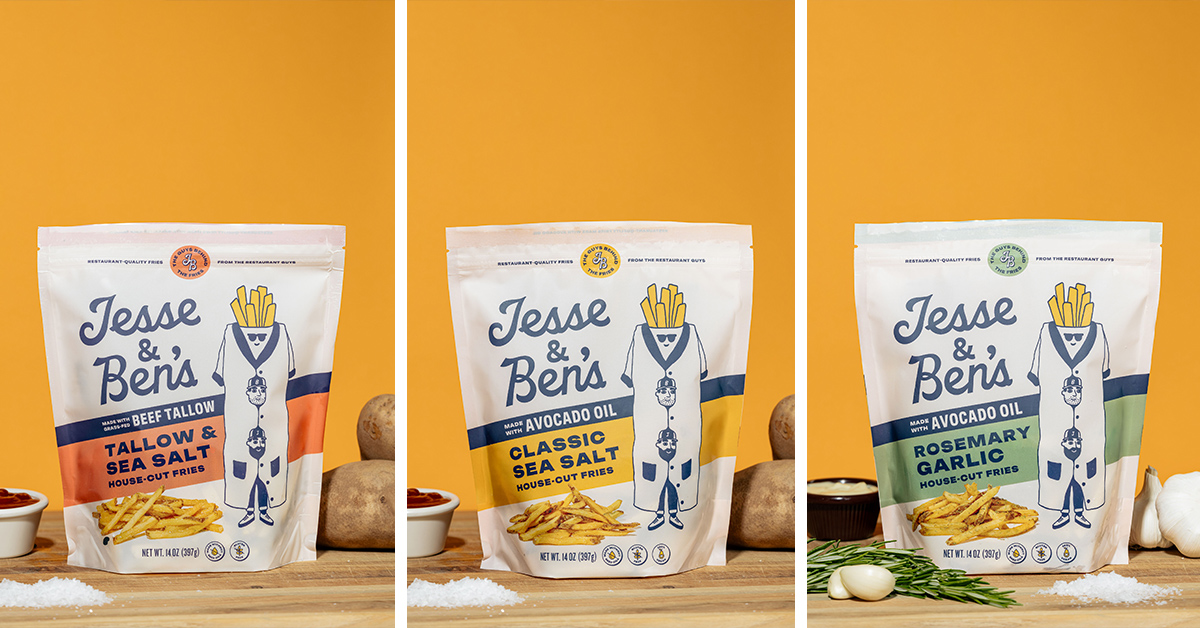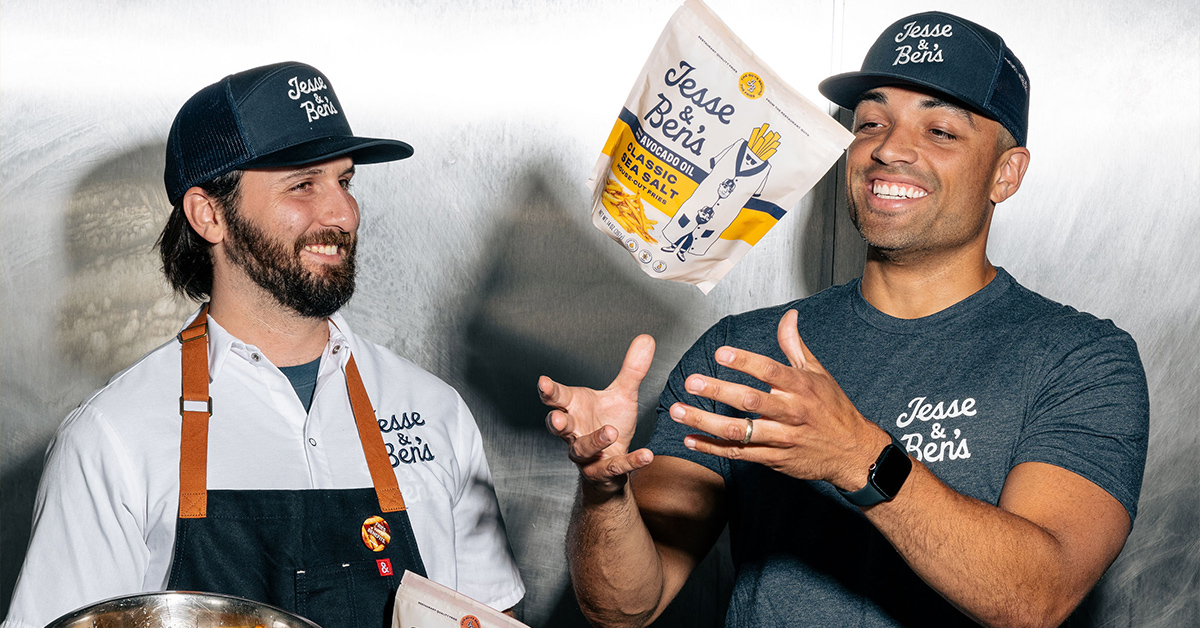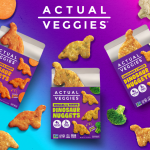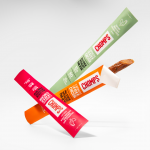Jesse & Ben’s Take Aim At ‘Big Potato’

Jesse & Ben’s was almost Ben and Jesse’s. That was until the duo realized the name would likely face pushback from another frozen brand pushing category boundaries: Ben & Jerry’s.
The Washington, D.C.-based frozen food company launched in June, and now its 3-SKU line of frozen french fries sits on-shelf just a few doors down from its almost-homophone. Jesse & Ben’s House Cut french fries aim to challenge category incumbents by leading with a deep connection to the people behind the brand and utilizing better-for-the-planet and -people ingredients.
“We think we win on [quality and taste], but it’s an easy thing for anyone to say,” said co-founder and CEO Jesse Konig. “We realize the one main thing that we do differently is that we’re actually a company that’s run by people – a small business with founders that care about driving this mission forward every single day. In the potato industry, that’s just not the case anymore.”
The fries are made with non-GMO potatoes and come in Classic Sea Salt, Rosemary Garlic and Tallow & Sea Salt varieties. The CPG concept evolved out of Konig and co-founder Ben Johnson’s restaurant and food truck operation, Swizzler. The duo is no stranger to taking risks and pivoting – they were working to open their first restaurant in spring 2020 when COVID hit – but the move into CPG marks the business’ most substantial shift yet.
Frying Up A Food Business
Konig and Johnson got their start in the food industry in 2010 as recent college grads with a goal to make better fast food. They began with gourmet hot dogs and fries sold from a food truck around D.C. and continued to test new approaches, including burgers, at farmer’s markets around the city, while embracing sustainable and ethical sourcing practices. The business took off in 2019, Konig said, and it was racing to open its first restaurant the following spring, but soon enough the pandemic shut everything down.
With down time during COVID and a drive to keep the business alive, Konig and Johnson looked for ways to reduce friction and costs within their restaurant’s operations. They landed on their menu’s supporting character – fries – and worked to perfect their approach while streamlining their operations by producing all of the fries in-house from one food truck kitchen.
“We’re really trying to replicate the process for a restaurant-quality fry, and what that means is a twice-fried Belgian-style fry, [which is] a more technical [definition],” explained Konig.
The resulting product is positioned around its omission of seed oils: The Classic and Rosemary products are made with avocado oil while the Tallow & Sea Salt is made with grass-fed beef tallow. As the world, and the restaurant, slowly reopened the duo recognized an opportunity to diversify the business into CPG after a quick stroll down a grocery frozen aisle.
“It was all the same brands, like a time capsule being in the ‘90s walking down the aisle with our parents,” Konig said. “Being business-oriented, out of college and when we’re cutting potatoes or cleaning fryers, oftentimes we’re listening to a podcast, like ‘How I Built This’ [and] you hear about challenger brands and [how] they come in and disrupt [a category]. This is exactly one of those things.”

Challenging Category Norms
According to Konig, the team has been testing the fries with industry experts as it has refined the approach over the past few years, garnering feedback and establishing early relationships with retail buyers. In the past nine months, they worked to bring the product into CPG and are now on-shelf at Whole Foods, MOM’s Organic Market and a wide range of specialty and independent retailers across the mid-Atlantic region.
The team intends to take a disciplined, regional approach to retail growth and will focus on its backyard in the Mid-Atlantic and eventually the Northeast and broader East Coast markets. As Jesse & Ben’s expands, it also aims to continue growing the impact it has on food systems via responsible sourcing practices for both its CPG line and restaurant, the latter of which already serves regenerative beef on buns produced by a local bakery.
“Diving into the food world, especially in the restaurant side of things, [there’s so much] that’s done the way it is, because ‘that’s the way it is,’” Konig said. “Because we didn’t know anything, we asked a million questions, we got the answers, and… It just didn’t feel like the right answer. So we started improvising a little bit and for us, a lot of that was around sourcing.”
While the regenerative movement has yet to infiltrate the potato supply chain due to logistical constraints with the crop’s cultivation – minimal soil disturbance is requirement of most regenerative agriculture certifications, an impossible task for harvesting the starchy root vegetable – Konig emphasized that it is working directly with farmers willing to use more sustainable growing and cultivation techniques.
“We’re trying to find great partners because we want to make sure we’re not making a promise to a customer that’s true one day, and then we’re growing really fast [and] we can’t hold that commitment,” Konig said. “One thing we’ve been committed to from our restaurants, what we’re doing now is, as we get bigger, we want to continue to get better.”
The Ben & Jerry To ‘Big Potato’
That commitment can also be traced back to the decision to create this brand with its co-founders as a central focus rather than extend the likeness of Swizzler into CPG. Unlike category incumbents, or “Big Potato” as Konig refers to them, the brand has the benefit of tying itself to the people behind the product and a mission they aim to execute on.
“It’s a really good way to hold ourselves to integrity, [and] we’re not going to cut corners because our name is on the bag – this is something that we stand for,” Konig emphasized. “It’s not something that we’re going to slap a label on and go try to sell it to a big company three years from now. We want to make sure that this is something that it lives on bigger than us. It’s not all about the two of us anyway, but we want to make sure that [integrity] is really in the company’s DNA.”
While Konig claims Big Potato has an iron grip on everything from potato sourcing, to manufacturing and frozen fry sales, Jesse & Ben’s isn’t alone in trying to build a better fry. Earlier this year veggie burger brand Actual Veggies expanded with a line of SuperFries. While the two brands share a similar ethos around seed oils, Actual Veggies took a wellness-forward approach and created a pea protein-infused fry with 6 grams of protein and 4 grams of fiber.
That leaves white space for a fry comparable to conventional options and allows Jesse & Ben’s to compete on the same product playing field as the category incumbents, fast food norms and sourcing standards it aims to upend via both foodservice and CPG.
“What people eat…what they actually go out and spend money on is usually what [influences] how things work in the food industry,” Konig said. “We realized fast food is one of the biggest things, still, 50 years later, and a lot of it’s done really wrong. So if we can prove a better way of doing things in fast food that’s how we could make a way bigger impact.”

















